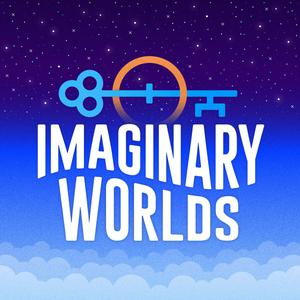
Imaginary Worlds
Eric Molinsky
- 35 minutes 54 secondsYou Are Lone Wolf: A Father/Son Quest
When Joe Dever died in 2016, he hadn’t written the last several books in his Lone Wolf series. The Lone Wolf books take place in a deeply rich fantasy universe, and they’re written as a combination of choose-your-own-adventure stories and role playing games like D&D. Joe’s final wish was that his son Ben would finish the series for him. However, Ben was unfamiliar with his father’s books, and the legions of Lone Wolf fans he would have to please. I talked with Ben Devere (who spells his last name differently) about the creative, practical, and personal struggles he went through as a writer, and how he was able to get to know his late father by immersing himself in his father’s fantasy world. Jonathan Stark, co-host of the official Lone Wolf podcast Journeys Through Magnamund, explains why Lone Wolf means so much to fans like him, and how he ended up fulfilling his own dreams of writing a Lone Wolf book.
Today's episode is sponsored by Henson Shaving, Magic Spoon and Miracle Made.
Visit www.hensonshaving.com/imaginary and use the code IMAGINARY to get two years' worth of blades free with your razor – just make sure to add them to your cart.
Get your next delicious bowl of high-protein cereal at www.magicspoon.com/imaginary and use the code IMAGINARY to save five dollars off.
Go to www.trymiracle.com/imaginary and use the code IMAGINARY to claim your free 3 piece towel set and save over 40% off.
Learn more about your ad choices. Visit megaphone.fm/adchoices
24 April 2024, 7:01 pm - 41 minutes 23 secondsAfrican Sci-Fi Looks to a Future Climate
When the writer Nnedi Okorafor coined the term Africanfuturism, she wanted to distinguish sci-fi written about Africa from Afrofuturism, which is focuses on the experiences of Black people in the diaspora. Africanfuturism mixes the traditional with the futuristic in a way that resembles modern life in Africa, and many of these stories grapple with climate change. Although the writer Chinelo Onwualu says cli-fi isn’t a subgenre for African writers. It’s often baked into a lot of Africanfuturism because the continent is already at the forefront of climate emergencies. And the writers Suyi Davies Okungbowa and Wole Talabi explain that Africanfuturist cli-fi isn’t as dystopian as Western cli-fi. These visions of the future may feel daunting but there is often a sense of hope and the solutions are more community focused. The actress Nneka Okoye reads from their stories, and other works by African writers.
This episode is sponsored by Babbel, Surf Shark and Magic Spoon
Get up to 60% off at Babbel.com/IMAGINARY
Get Surfshark VPN at Surfshark.deals/IMAGINARY
Go to MagicSpoon.com/IMAGINARY and use the code IMAGINARY to save five dollars off
Reading list from this episode:
- Works of Nnedi Okorafor
- Wole Talabi’s anthology Convergence Problems
- Suyi Davies Okungbowa's novella Lost Ark Dreaming
- Chinelo Onwualu’s short story Letters to My Mother
- Dilman Dila’s story The Leafy Man from the book A Killing in the Sun
- Mame Bougouma’s story Lekki Lekki from Africanfuturism: An Anthology
- Omenana Magazine
Learn more about your ad choices. Visit megaphone.fm/adchoices
10 April 2024, 7:01 pm - 48 minutes 15 secondsWhen All Is Said in Dune
Back in 2018, I interviewed language creator David J. Peterson about how he invented Dothraki for Game of Thrones and other fictional languages in fantasy worlds. David and his wife Jessie just finished a huge project – developing the Fremen language for Dune: Part Two. I talk with the couple about their creative process and the challenge of imagining simple English phrases in the Chakobsa language that Frank Herbert imagined in his Dune novels. We also hear my 2018 episode, “Do You Speak Conlang?” where I also talked with Marc Okrand, inventor of the Klingon language, and Robyn Stewart, a language consultant for Star Trek: Discovery. Plus, Jen Usellis -- a.k.a. Klingon Pop Warrior -- will give you a serious case of earworms (not the kind from Wrath of Khan.)
For more episodes about Dune, check out my 2017 episode The Book of Dune, where I talked with Muslim fans of the series about the way Frank Herbert incorporated aspects of Islam into the books. And in 2021, I did an episode called The Ecology of Dune where I looked at the environmental messages in the books and whether Frank Herbert’s environmental sensibilities still hold up today.
This episode is sponsored by Surfshark and Magic Spoon.
Get Surfshark VPN at Surfshark.deals/imaginary and enter the promo code IMAGINARY for three extra months for free.
Get a custom bundle of Magic Spoon cereal at magicspoon.com/imaginary. Enter the promo code IMAGINARY at checkout to save five dollars off.
Learn more about your ad choices. Visit megaphone.fm/adchoices
27 March 2024, 7:01 pm - 36 minutes 50 secondsMother-in-Law of Oz
The Wizard of Oz is deeply ingrained into our culture. While many people can practically recite the 1939 movie, the original source material isn’t as well known. The Wonderful Wizard of Oz by L. Frank Baum was published in 1900. There are a lot of theories as to what inspired Baum – but the answer may be who rather than what. Baum’s mother-in-law Matilda Joslyn Gage was a groundbreaking writer and activist who could’ve been in every high school history textbook if she hadn’t had a falling out with the leaders of the suffrage movement. But her ideas live on in The Land of Oz. I talk with historian Sally Roesch Wagner and UNC-Charlotte professor Dina Massachi about the politics of gender in Gage’s works and Baum’s stories. And I talk with therapist Dr. Gita Dorothy Morena who has a very personal connection to the books.
Go to https://hensonshaving.com and enter IMAGINARY at checkout to get 100 free blades with your purchase. Remember to add both the 100-blade pack and the razor for the discount to apply.
Try Surfshark risk-free with a 30-day money-back guarantee. Get Surfshark VPN at Surfshark.deals/imaginary. Enter the promo code IMAGINARY for three extra months for free!
Learn more about your ad choices. Visit megaphone.fm/adchoices
13 March 2024, 7:01 pm - 23 minutesBonus: Turtles and Toys Outtakes
In the previous episode, I interviewed documentary filmmaker Isaac Elliot-Fisher about He-Man and Teenage Mutant Ninja Turtles. Isaac had so many great anecdotes about the history of those franchises that I couldn’t fit in. In this bonus episode of outtakes, Isaac explains the history of the term toyetic, the haphazard way He-Man came together, and why the 1990 live action TMNT film was so much darker than the cartoon show.
Learn more about your ad choices. Visit megaphone.fm/adchoices
6 March 2024, 8:01 pm - 40 minutes 56 secondsClass of '84: Turtles, Transformers and Toys Takeover TV
In the final episode of our mini-series Class of '84, we look at two iconic franchises that launched in 1984: Transformers and Teenage Mutant Ninja Turtles. They came from opposite ends of the business spectrum. Transformers was a top-down marketing synergy between American and Japanese toy companies along with Marvel Comics to compete against He-Man -- another TV toy behemoth. Teenage Mutant Ninja Turtle would eventually rival them in cultural dominance, but it began with two indie comic book creators making a black and white comic as a lark. But Turtles and Transformers both ended up wrestling with similar questions around what happens when you put the cart before the horse in creating content to sell products. Documentary filmmaker Isaac Elliot-Fisher and Cartoon Art Museum curator Andrew Farago talk about the incredible rags to riches story of the Turtles creators, and how success changed them. And I talk with Bob Budiansky, who created many of the original Transformers characters for Hasbro and Marvel Comics.
Learn more about your ad choices. Visit megaphone.fm/adchoices
28 February 2024, 11:00 pm - 41 minutes 12 secondsClass of '84: When Cyber Was Punk
In the second episode of our mini-series on groundbreaking works from 1984, we jack into the system and upload our minds into Neuromancer. William Gibson’s novel became a seminal work of cyberpunk, where he introduced words like “cyberspace” and storylines that would become tropes of the genre. Sci-fi writer Eileen Gunn, and professors Sherryl Vint of UC Riverside and Hugh O’Connell of UMass Boston discuss how Neuromancer not only predicted the future of technology with surprising accuracy, but it also imagined the way that high tech would help fuel a new type of hyper capitalism. I also talk with Chris Miller aka Silver Spook, creator of the game Neofeud, and Gareth Damian Martin, creator of the game Citizen Sleeper, about how they used indie games to bring cyberpunk back to its roots in Neuromancer. Also, Lincoln Michel discusses why in his novel The Body Scout, he wanted to bring cyberpunk out of cyberspace. Featuring readings by actor Varick Boyd.
This week’s episode is sponsored by Ship Station, Henson Shaving and Babbel.
Use the promo code “imaginary” at shipstation.com to sign up for a free 60-day trial.
Visit hensonshaving.com/imaginary to pick the razor for you and use the code “imaginary” to get two years' worth of free blades.
Get 50% off at Babbel.com/imaginary.
Learn more about your ad choices. Visit megaphone.fm/adchoices
14 February 2024, 10:00 pm - 22 minutes 17 secondsBonus: Rise of The Villains Outtakes
When I interviewed special effects artist Shannon Shea about The Terminator and other villains of ’84, we also discussed his experiences working on Terminator 2. He tells me about the many life-sized puppets of Arnold Schwarzenegger they built and how the industry has changed in the last 40 years. We also hear an outtake from my conversation with Neill Gorton about why the industry is moving away from depicting villains with scars and disabilities.
Learn more about your ad choices. Visit megaphone.fm/adchoices
7 February 2024, 10:00 pm - 37 minutes 56 secondsClass of '84: Rise of The Villains
This year marks the 40th anniversary of a lot of landmarks in pop culture, especially sci-fi and fantasy. So many franchises were born in 1984. Some came to define their genre or invent new genres. In this three-part mini-series, we look at how The Class of ’84 made their mark on the world. First up: the bad guys. 1984 was a great year for villains from The Terminator to Freddy Krueger to Gremlins and Ghostbusters. I talk with make-up and creature designers Neill Gorton and Shannon Shea (who worked on Terminator and Nightmare On Elm Street sequels) about why the '80s was a golden age of monsters. Criminal psychology professor Yannie ten Brooke analyzes the ’84 villains and why they scared us. And I talk with pastor and podcaster JR Forasteros about why they don’t make villains like they used to – for better and for worse. You can also find Shannon at Two Chez on Etsy.
Today’s episode is sponsored by Magic Spoon and Green Chef.
Go to magicspoon.com/imaginary to grab a variety pack and be sure to use our promo code IMAGINARY at checkout to save five dollars off your order.
Go to greenchef.com/60imaginary and use the code 60imaginary to get 60% off, plus 20% off your next two months.
Learn more about your ad choices. Visit megaphone.fm/adchoices
31 January 2024, 10:00 pm - 40 minutes 36 secondsMaking Blue Eye Samurai
I was blown away by the Netflix animated series Blue Eye Samurai. I’m not alone, it has 100% rating on Rotten Tomatoes. I was pleasantly surprised to discover the supervising director and producer of the show, Jane Wu, began her career as an animation storyboard artist. In fact, we were working at different animation studios at the same time in L.A. We talk about why she took a live action approach to planning animated sequences in Blue Eye Samurai, and how she wanted to represent Japanese culture in a way that’s never been done in Western animation. Jane also discusses how her background in martial arts and how her personal history helped her understand the main character Mizu, a woman with dual identities on a quest for revenge 17th century Japan.
Use the promo code IMAGINARY at shipstation.com to sign up for your free 30-day trial.
Go to hensonshaving.com and enter IMAGINARY at checkout to get 100 free blades with your purchase. (Note: you must add both the 100-blade pack and the razor for the discount to apply.)
Learn more about your ad choices. Visit megaphone.fm/adchoices
17 January 2024, 8:00 pm - 48 minutes 43 secondsPrologue to Ursula K. le Guin
In the 1960s, Ursula K. le Guin represented a changing of the guard in science fiction literature. She was part of a generation of novelists who questioned the colonist mindset which had influenced American sci-fi for most of the 20th century. Le Guin came to this understanding not just as a moral stance or an intellectual exercise. Issues of racism and colonialism were personal to her. This episode, originally titled “The Word For Man Is Ishi,” comes from the podcast The Last Archive from Pushkin Industries hosted by Jill Lepore and Ben Naddaff-Hafrey.
Learn more about your ad choices. Visit megaphone.fm/adchoices
3 January 2024, 10:00 pm - More Episodes? Get the App
Your feedback is valuable to us. Should you encounter any bugs, glitches, lack of functionality or other problems, please email us on [email protected] or join Moon.FM Telegram Group where you can talk directly to the dev team who are happy to answer any queries.
 Twenty Thousand Hertz
Twenty Thousand Hertz
 What Roman Mars Can Learn About Con Law
What Roman Mars Can Learn About Con Law
 Decoder Ring
Decoder Ring
 Articles of Interest
Articles of Interest
 99% Invisible
99% Invisible
 The Allusionist
The Allusionist